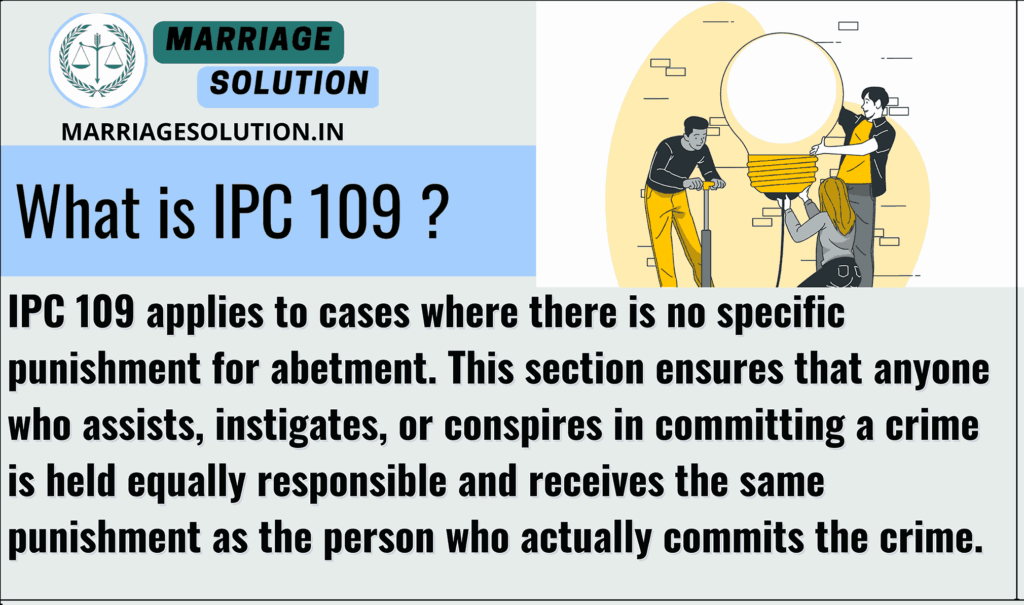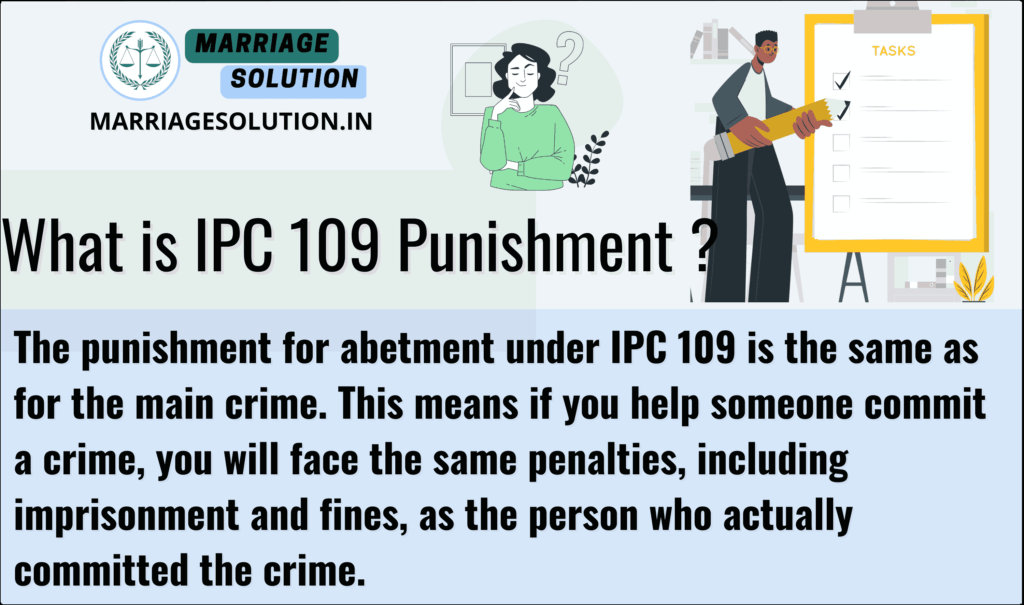Introduction of 109 IPC
IPC 109 is a section of the Indian Penal Code that deals with abetment. It means if you encourage, help, or plan with someone to commit a crime and there is no separate punishment for abetment, you will receive the same punishment as the main offender.
- Introduction of 109 IPC
- What is IPC Section 109 ?
- IPC Section 109 Overview
- 109 IPC Punishment
- 109 IPC bailable or not ?
- Section 109 IPC case laws
- 109 OF IPC
- Section 109 IPC in short information
- 109 IPC FAQs
- If you need support with court proceedings or any other legal matters, don’t hesitate to reach out for assistance.
What is IPC Section 109 ?
IPC 109 applies to cases where there is no specific punishment for abetment. This section ensures that anyone who assists, instigates, or conspires in committing a crime is held equally responsible and receives the same punishment as the person who actually commits the crime.

IPC Section 109 Overview
Key Points: Easy Breakdown of IPC 109
- Introduction to IPC 109
- IPC stands for the Indian Penal Code.
- Section 109 deals with abetment.
- Abetment means encouraging or helping someone commit a crime.
- What is IPC 109?
- IPC 109 applies when there is no separate punishment for abetment.
- It means if you help someone commit a crime, and there’s no specific punishment for helping, you get the same punishment as the main crime.
- Types of Abetment Under IPC 109
- Abetment by instigation: Encouraging someone to commit a crime.
- Abetment by conspiracy: Planning with others to commit a crime.
- Abetment by aiding: Helping someone commit a crime.
- Punishment Under IPC 109
- The abettor gets the same punishment as the main offender.
- This ensures that anyone who helps in the crime is equally responsible.
- Bailable or Not?
- Whether abetment is bailable or not depends on the nature of the abetted crime.
- For serious crimes, abetment is usually non-bailable.
- Examples of IPC 109 in Action
- Encouraging someone to commit theft.
- Helping a person plan fraud.
- Assisting in hiding evidence of a crime.
109 IPC Punishment
The punishment for abetment under IPC 109 is the same as for the main crime. This means if you help someone commit a crime, you will face the same penalties, including imprisonment and fines, as the person who actually committed the crime.

109 IPC bailable or not ?
Whether abetment under IPC 109 is bailable depends on the severity of the crime abetted. For minor offenses, it may be bailable. However, for serious crimes, such as murder, abetment is generally non-bailable.
Section 109 IPC case laws
Case Laws Related to IPC Section 109
1. R v. Aung Hla (1911)
- Facts: Accused abetted in a murder by providing weapons.
- Judgment: Convicted under IPC 109.
- Evidence: Weapons traced back to the accused.
- Significance: Established material support as abetment.
- Legal Principle: Supplying tools for crime amounts to abetment.
2. State of Maharashtra v. Sukhdev Singh (1961)
- Facts: Accused encouraged a youth to commit theft.
- Judgment: Convicted for abetment.
- Evidence: Testimonies from the youth.
- Significance: Highlighted verbal encouragement as abetment.
- Legal Principle: Words alone can constitute abetment if they instigate a crime.
3. Ram Kumar v. State of Haryana (1972)
- Facts: Accused conspired to commit a robbery.
- Judgment: Convicted under IPC 109.
- Evidence: Detailed plans and communications.
- Significance: Reinforced conspiracy as abetment.
- Legal Principle: Planning a crime is abetment even without direct action.
4. Queen-Empress v. Abdullah (1885)
- Facts: Accused aided in committing fraud.
- Judgment: Convicted for abetment.
- Evidence: Financial transactions traced to accused.
- Significance: Showed financial aid as abetment.
- Legal Principle: Providing financial support for crime is abetment.
5. Ratan Lal v. State of Rajasthan (1966)
- Facts: Accused abetted arson by inciting others.
- Judgment: Convicted under IPC 109.
- Evidence: Witnesses to incitement.
- Significance: Emphasized incitement as abetment.
- Legal Principle: Encouraging violence is punishable as abetment.
6. Emperor v. Nawab Mirza (1922)
- Facts: Accused abetted forgery.
- Judgment: Convicted for abetment.
- Evidence: Forged documents linked to accused.
- Significance: Reinforced abetment in forgery.
- Legal Principle: Assisting in document falsification is abetment.
7. State of UP v. Ram Chandra (1957)
- Facts: Accused abetted dacoity by providing hideout.
- Judgment: Convicted under IPC 109.
- Evidence: Hideout confirmed as property of accused.
- Significance: Showed abetment by sheltering criminals.
- Legal Principle: Offering refuge to criminals is abetment.
8. King Emperor v. Tirumal Reddy (1914)
- Facts: Accused abetted counterfeiting by supplying materials.
- Judgment: Convicted for abetment.
- Evidence: Counterfeit materials traced back to accused.
- Significance: Highlighted material supply as abetment.
- Legal Principle: Supplying tools for counterfeiting is abetment.
9. State of Karnataka v. Ramesh (1999)
- Facts: Accused abetted human trafficking.
- Judgment: Convicted under IPC 109.
- Evidence: Victim testimonies and transaction records.
- Significance: Emphasized abetment in human trafficking.
- Legal Principle: Facilitating human trafficking is abetment.
10. Queen v. Chinta Yadav (1959)
- Facts: Accused abetted smuggling.
- Judgment: Convicted for abetment.
- Evidence: Smuggled goods linked to accused.
- Significance: Showed abetment in smuggling operations.
- Legal Principle: Assisting in smuggling is abetment.
109 OF IPC
IPC 109A: Abetment of offenses punishable under Chapter VI
- Scope: This subsection focuses on abetment of offenses under Chapter VI, which deals with offenses against the state.
- Jurisdiction: Covers abetment of crimes like waging war against the government.
- Examples: Assisting in a plan to attack government institutions.
- Punishment: Abettor faces the same severe penalties as the principal offender.
- Evidence Requirements: Needs concrete proof of the abettor’s involvement.
- Impact: Emphasizes strict punishment to deter crimes against the state.
- Legal Proceedings: Involves complex investigations and trials.
- Challenges: Proving direct abetment in state-related crimes can be difficult.
IPC 109B: Abetment of offenses punishable under Chapter XVI
- Scope: This subsection deals with abetment of offenses under Chapter XVI, which involves crimes affecting the human body.
- Jurisdiction: Includes abetment of murder, assault, kidnapping, etc.
- Examples: Encouraging someone to commit a murder.
- Punishment: Abettor receives the same punishment as the main offender.
- Evidence Requirements: Must prove clear intent and involvement.
- Impact: Ensures abettors in violent crimes are equally punished.
- Legal Proceedings: Often involves witness testimonies and forensic evidence.
- Challenges: Establishing the abettor’s direct role and intent.
IPC 109C: Abetment of offenses punishable under Chapter XVII
- Scope: Focuses on abetment of offenses under Chapter XVII, which deals with property crimes.
- Jurisdiction: Includes theft, robbery, dacoity, etc.
- Examples: Helping plan a burglary.
- Punishment: Same as the punishment for the main crime.
- Evidence Requirements: Needs proof of assistance or encouragement.
- Impact: Holds all parties in property crimes accountable.
- Legal Proceedings: Relies on physical evidence and accomplice testimonies.
- Challenges: Proving abetment without direct involvement in the crime.
IPC 109D: Abetment of offenses punishable under Chapter XVIII
- Scope: Covers abetment of offenses under Chapter XVIII, involving forgery and counterfeiting.
- Jurisdiction: Includes abetment in creating or distributing fake currency, documents, etc.
- Examples: Assisting in producing counterfeit money.
- Punishment: Abettor faces the same punishment as the forger.
- Evidence Requirements: Requires solid evidence linking abettor to the forgery.
- Impact: Deters people from participating in forgery-related activities.
- Legal Proceedings: Involves financial and technical investigations.
- Challenges: Proving abetment in sophisticated forgery operations.
Section 109 IPC in short information
| Offense | Definition | Punishment | Bailable or Not |
|---|---|---|---|
| Abetment | Encouraging, aiding, or conspiring to commit a crime | Same as the main offender if crime is committed | Depends on the nature of the crime |
109 IPC FAQs
What does IPC 109 cover?
IPC 109 covers abetment when there is no specific punishment for it, making the abettor liable for the same punishment as the main crime.
Is abetment under IPC 109 bailable?
It depends on the severity of the crime. For serious crimes, abetment is usually non-bailable.
What is the punishment for abetment under IPC 109?
The abettor receives the same punishment as the main offender if the crime is committed.
Can someone be charged under IPC 109 if the crime is not committed?
No, IPC 109 applies only if the crime is actually committed.
Are there different types of abetment?
Yes, abetment can be by instigation, conspiracy, or aiding.
If you need support with court proceedings or any other legal matters, don’t hesitate to reach out for assistance.
Court or any other marriage-related issues, our https://marriagesolution.in/lawyer-help-1/ website may prove helpful. By completing our enquiry form and submitting it online, we can provide customized guidance to navigate through the process effectively. Don’t hesitate to contact us for personalized solutions; we are here to assist you whenever necessary!
